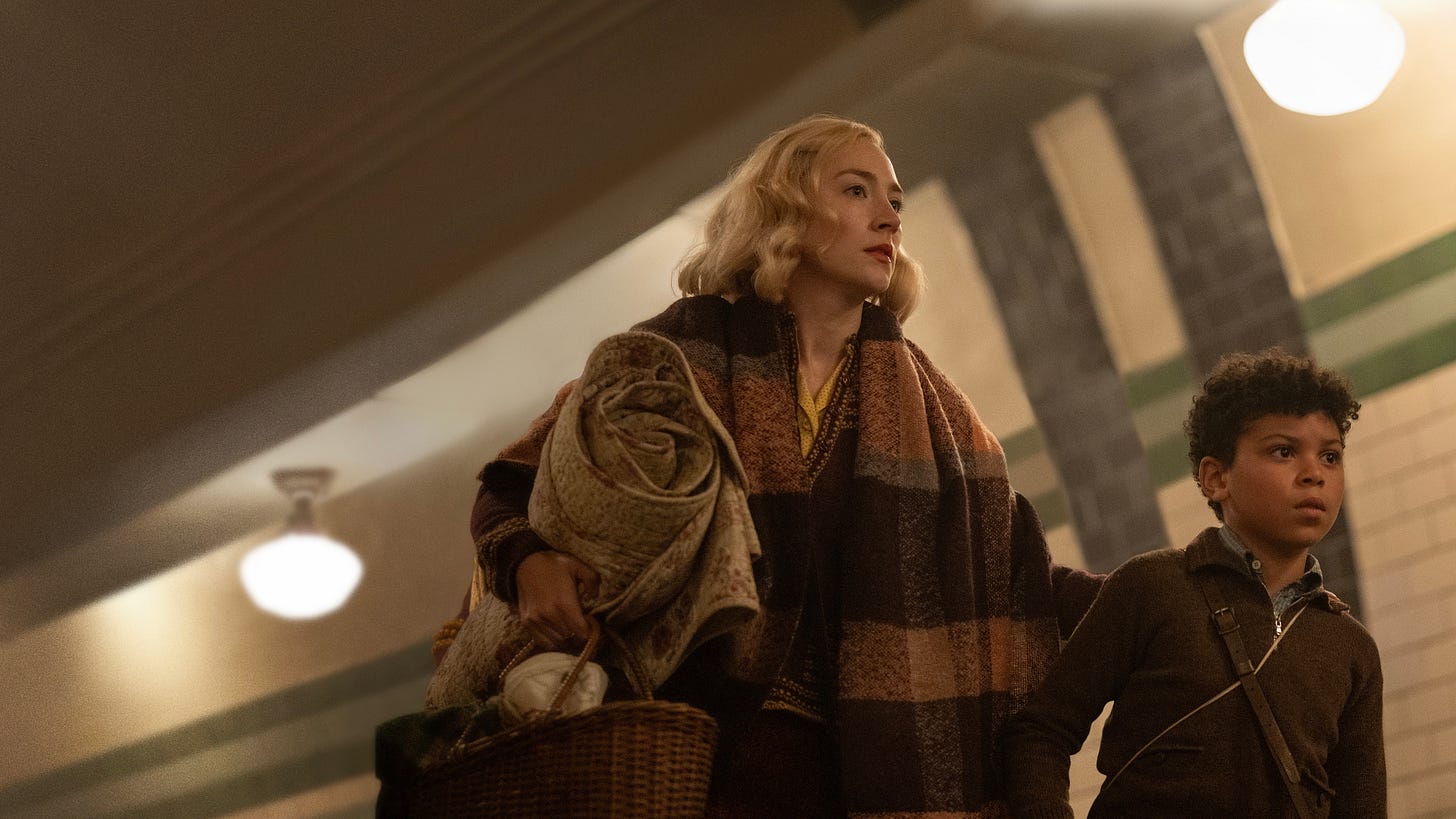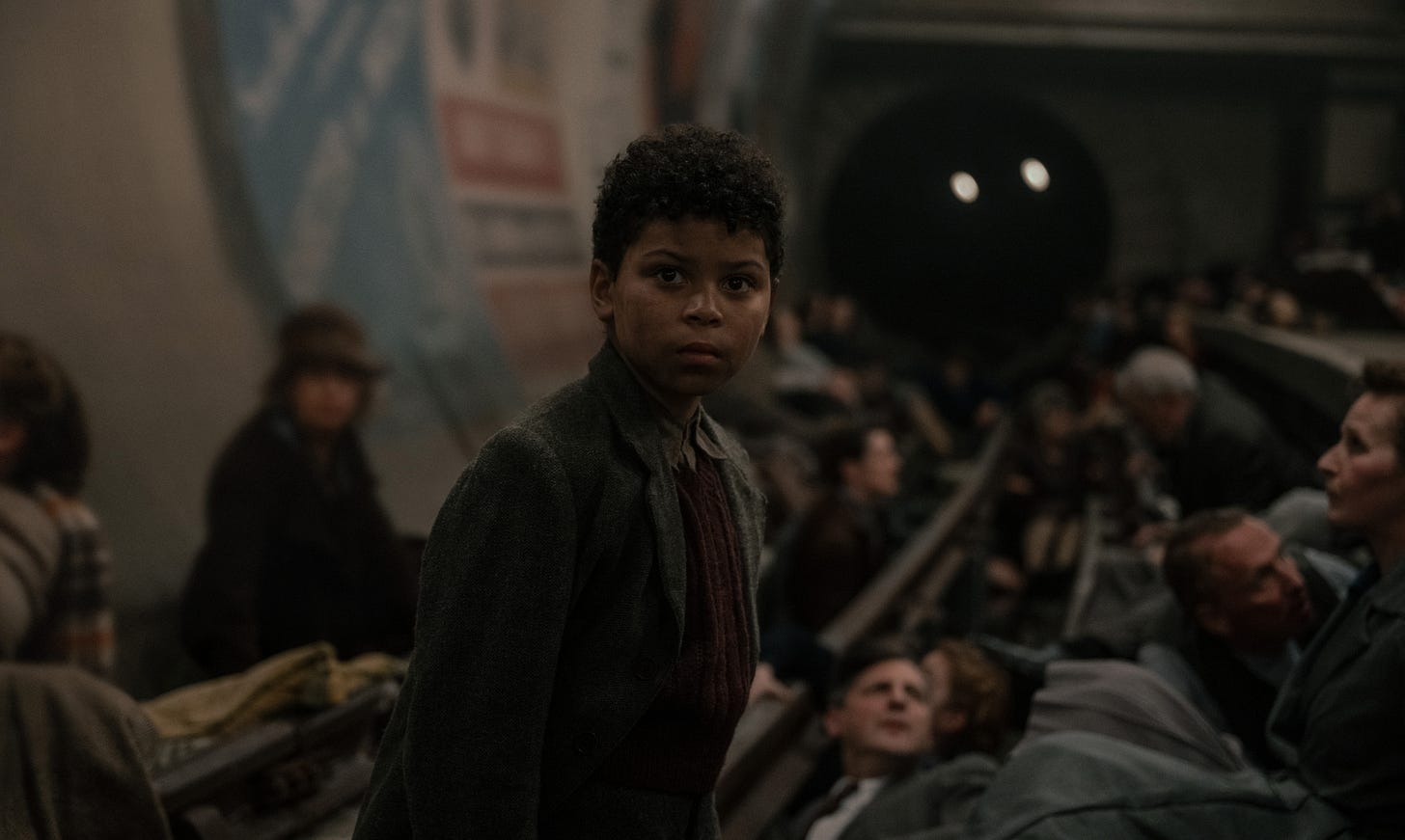NYFF Dispatch 6: Blitzkrieg Flop
Steve McQueen’s ambitious festival closer doesn’t rise above its formula.
Just as this is being published, the lights are going up in Alice Tully Hall, where Blitz, the New York Film Festival’s Closing Night selection, has just concluded. Steve McQueen is sitting down for a Q&A, just a day after the world premiere in London. (The film’s stars, Elliott Heffernan and Saoirse Ronan, were unable to make it due to a canceled flight.) I saw the film earlier today, at the final press & industry screening, which happened to be the first crisp day of the season. It’s a relief for the festival to wrap up as we get into jacket weather, because if it had been any colder while waiting in that line, I would have called it the New York Fridge Festival.
The end of NYFF is bittersweet. Sweet because I’ll have more time to cook now that I’m not seeing three or four movies every day, bitter because I’m no longer seeing three or four movies every day. It’s not quite over: there’s a few more movies that I’m seeing this weekend, and there’s still tickets available for some of the encore screenings if you feel like watching something too. (If you want recommendations, check out Happyend, Pavements, Việt and Nam, or Oh, Canada! Not just because they’re among my favorites of the fest, but also they probably won’t be released for several months.)
I would like to say that Blitz was a good way to end the festival, but unfortunately this has kept the curse going of “NYFF Closing Night films are not very good.”
Blitz
Opens November 1 in limited release; streaming on Apple TV+ November 22.
Steve McQueen has made some great movies in his career. Shame, Widows, and Lovers Rock are all terrific. 12 Years a Slave won Best Picture at the Oscars. But his newest movie won’t be mentioned in the same breath as those masterworks. It’s not that Blitz is a bad movie, far from it. But despite McQueen’s unique perspective and technical competence, the film is at heart a middlebrow, middle tier British World War II drama. It will probably win a lot of BAFTAs and Oscars.
The film is set in London during the Blitz bombings in the fall of 1940. The Germans attack without warning, and shelter could be hard to find. In this dangerous environment, single mother Rita (Saoirse Ronan) sends her son, George (Elliott Heffernan), to the countryside as part of an evacuation. McQueen’s script splits its time between the two, as she works at a munitions factory while coping with the separation. Ronan, as always, is in fine form and delivers a fierce performance. Even if Rita doesn’t do anything that we haven’t seen in other stories, the actress makes her character more compelling than it ought to be. One highlight is of her singing for a BBC Radio-sponsored talent show. “Winter Coat,” which was written by Taura Stinson and Nicholas Britell, is a sweet pop tune that’s period authentic.
George is not happy about leaving behind his mum and grandad (Paul Weller, an influential figure in British rock music), and bails from his train ride away from the city. He embarks on a perilous journey to get back to his home on the East End. Heffernan, who is just eleven years old, turns in a very good, natural performance with his first professional acting job. But the dangers he faces can feel unnatural. At times, it seems like an action sequence exists only because the studio said something loud and exciting should happen at the 30 minute mark.
The film gets interesting when McQueen explores George’s mixed race heritage. He never knew his father, a native of Grenada who was the victim of a racist attack. Blitz finds its poignancy and urgency when it addresses head-on the realities of being non-white in England. The film’s most artful scene comes when George wanders an abandoned shopping hall, window displays extolling the plunder of the British Empire. Next to sacks of coffee beans are stereotypical statuettes of Africans, which McQueen’s camera remarks upon without comment; none is needed. George is spotted by Ife, a kindly Nigerian watchman (musician Benjamin Clementine), and he gives the boy a crash course in Blackness. Until that point, the boy didn’t consider himself Black, but he comes to find pride in his identity. It was during these touching scenes of George’s burgeoning racial consciousness that I wondered if Blitz was transforming from just another prestige war drama into something else. McQueen was using these familiar trappings as a Trojan Horse to tell a story far more poignant.
But as admirable as this perspective is, it doesn’t change the fact that on an artistic level, Blitz is decidedly old fashioned. To McQueen’s credit, it’s ambitious to take a familiar form and subvert it while still being recognizable and approachable. But I don’t think he was successful. Not doing the film any favors is Hans Zimmer’s shrill, bombastic score. And while the director has always been more of a storyteller than a visual stylist, this film looks particularly bland. Yorick Le Saux shot this on 35mm, but you wouldn’t know that just by looking at the image. Overly sleek in the daytime scenes and illegible in the dark, it looks like a movie made for streaming.
There is another great setpiece in Blitz, centered around a nightclub performance by swing bandleader Ken “Snakehips” Johnson. It’s basically the only scene that doesn’t feature our principal mother and son characters. One wonders what kind of film McQueen could have made, unbound by tradition. But just as the sun, once upon a time, never set on the British Empire, perhaps it’s impossible to innovate within the confines of a British war drama. The conventions are as stiff as a Brit’s upper lip.
★★★☆☆
This review was written relatively hastily (start to finish in 90 minutes), an experiment to see how quickly I could turn this around. Any awkward statements or misrepresentations are because of that!






